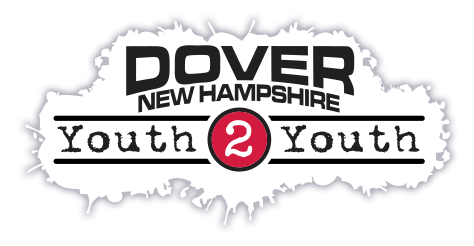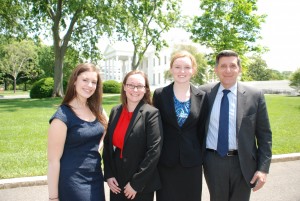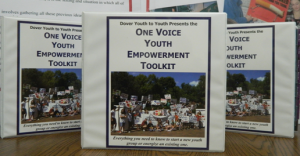(WASHINGTON, D.C.) – On Wednesday May 20th, during a ceremony at the White House, National Drug Control Policy Director Michael Botticelli honored Dover Youth to Youth as an “Advocate for Action.” Every year, the White House Office of National Drug Control Policy recognizes people who are making a difference in their communities through advocacy or direct services. Their work supports the Administration’s efforts to reduce drug use and its consequences through a public health and public safety approach.
Dover Youth to Youth (Y2Y) is a 70-student youth empowerment program coordinated by the Dover, New Hampshire, Police Department. These students in grades 6-12 meet weekly to develop creative ways to address substance use issues. They have been the most active sector of the Dover Coalition for Youth and have helped the Coalition achieve its goals as part of the Drug-Free Communities Support Program.
In the past year alone, Youth to Youth students have given presentations to more than 2,000 youth and parents in the community about substance use issues, created 10 public service announcements (PSAs) that were broadcast on local radio stations, created two video PSAs that aired on New Hampshire’s ABC affiliate, proposed and testified for a city ordinance banning smoking in a city music venue, spoke before the New Hampshire Senate against the legalization of marijuana, and convinced a gas station near a school zone to remove 15 tobacco advertising signs. These youth advocates also conducted two street demonstrations on alcohol awareness issues, including the multi-faceted “Fridge Campaign” to heighten parental awareness that young kids often access alcohol in the home.
In addition to its positive impact in the local community, Y2Y is known for its work helping other coalitions and youth groups. Regionally, the group has established a network of 7 youth groups in surrounding communities that are following the Dover model and replicating many of these activities. Dover Youth to Youth has developed a youth empowerment Toolkit to allow other youth groups to take advantage of the resources they created. The Toolkit materials are now being used by more than 100 communities across the country. Dover Youth to Youth’s model of youth empowerment and the supporting Toolkit have been added to New Hampshire’s list of evidence-based programs.
“I am pleased to honor the work Dover Youth to Youth is doing to make our communities healthier and safer,” said Director Botticelli. “By promoting evidence-based prevention, treatment and recovery efforts, Advocates for Action are helping to reduce drug use and its consequences across the country.”
“I have been fortunate to be involved with a group of teens that has passed legislation, conducted training and created media to bring important drug prevention messages to my peers, to parents and to others,” said Youth to Youth member Emily Simons. “It’s also exciting that we have become a model and a resource for other communities that would like to see their youth active in preventing drug problems and creating change.”
The Obama Administration’s budget for fiscal year 2016 contains more than $12 billion for reducing drug use in the United States through prevention and treatment programs – an increase of more than $768 million over the fiscal year 2015 enacted level. Combined with supply reduction funding, a total of nearly $27.6 billion dollars was requested for Federal drug control programs for 2016. This budget demonstrates the Administration’s ongoing commitment to a science-based drug policy with a balanced approach to public health and public safety.
For photos and videos of the 2015 Advocates for Action, please visit: https://www.whitehouse.gov/ondcp/national-drug-control-strategy/advocates-for-action-2015
For more information on ONDCP’s work to reduce drug use and its consequences, visit: http://www.WhiteHouse.gov/ONDCP




